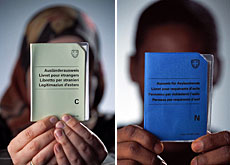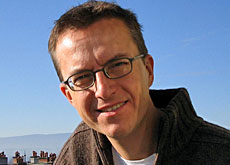British and Swiss exchange views on diversity

On the 60th anniversary of the British Council Switzerland, diversity specialists from both countries have met in Zurich for a candid exchange of thoughts.
The discussion comes as Britain struggles with Muslim integration and Switzerland votes next month on whether to accept tougher legislation on asylum seekers and foreigners.
The British Council Switzerland says it aims to contribute to the long-term development of British and Swiss relationships “based on shared values of trust, creativity, mutuality, professionalism and integrity”.
To this end, it organised a diversity roundtable at the Swiss Re Centre for Global Discussion, overlooking Lake Zurich.
Participants spent the first 30 minutes trying to define diversity, a “difficult” term which “needed clarity”, according to Baroness Young of Hornsey, an arts and heritage consultant who has sat in the British House of Lords as a politically independent peer since 2004.
“We need to move away from loaded multicultural terms and look not just at race and religion but also at sexuality, class and other factors,” she said.
Christoph Meier, head of the immigration office of the city of Zurich, wondered whether a definition was in fact necessary.
He said it was “more important to know where we want to go” and that it was dangerous to pigeonhole people, especially immigrants, in one category.
However, Nathalie Amstutz, professor of gender and diversity management at the Northwestern Switzerland Technical College, said you had to name the entities you wanted to protect.
Charlotte Gubler, head of human resources at Swiss Re, maintained that the consideration of diversity issues in a company is an economic imperative and has a direct impact on profitability.
“Unless you have consistency of values, you can’t move the company forward,” she said.
The participants found common ground in the need for an intensified cooperation between different players from the public and private sectors.
The discussion ended with a call for more future-oriented diversity policies, moving away from a pure moral case towards a focus on the realistic gains such policies can make for all members of society.
Achievements
Baroness Young explained what she considered the best way of achieving the British Council’s general purpose of building “mutually beneficial relationships” between Britain and other countries.
“For me it is through arts and culture, which I think have a great capacity to provoke debate – sometimes difficult and challenging – and stimulate inquiry,” the former actress told swissinfo.
“It’s a good way of saying ‘here are my cultural goods, let me see some of yours’. You can have this exchange on an equal footing in culture and arts in a way that is not necessarily possible through politics.”
Baroness Young said one of the greatest achievements in Britain “is that we talk about cultural diversity”.
“I don’t think we’re in that ‘all love one another and all live together’ multicultural heaven, but I think we are increasingly aware of the challenges of cultural diversity.”
Challenges
Some people, however, might point to the considerable difficulties Britain is having integrating Muslims – 23 British Muslims were arrested on August 10 in connection with an alleged plot to blow up aeroplanes over the Atlantic – and ask who Britain is to dish out advice on cultural diversity.
“This is a very difficult one,” Baroness Young admitted. “It’s an incredibly complex situation. First of all I would never want to be in a position – either individually or on behalf of Britain – to hand out advice to other people. What I would hope is to always be in a position of exchange and dialogue.
“We all have to work at this – you can’t just put people next to each other … and then sit back. This has been brought home to Muslim and other communities in Britain in the starkest and most terrifying way possible.”
swissinfo, Thomas Stephens
Swiss naturalisation:
People who have been resident in Switzerland for 12 years may apply for naturalisation.
Switzerland grants citizenship to people who are well integrated and comply with Swiss law.
Applicants are naturalised by Swiss cantons and communes. The procedure can vary considerably.
In 2004 the Swiss people rejected a simplified naturalisation procedure for second- and third-generation foreigners.
In 2005, 39,753 naturalisations were registered – a record for Switzerland.
There are 1.5 million foreigners currently living in Switzerland, out of a total population of seven million people.
The British Council is Britain’s principal agency for cultural relations with other countries and is represented in 110 countries worldwide.
British Council Switzerland was founded in 1946 and is based in the capital city, Bern.
In 2005 around 1,000 students took exams with the British Council Switzerland.
Around 1,500 Swiss students studied in further and higher education in Britain.
Under the revised asylum law, rejected asylum seekers would no longer receive social welfare payments and the maximum detention period for foreigners awaiting deportation would be raised to 18 months.
The granting of admission on humanitarian grounds has been ruled out. But it has been made easier for those granted asylum to be joined by their families and to work.
Also to be voted on in September will be a revision to Switzerland’s immigration law, called the Foreigners National Act, which favours EU and Efta nationals and limits the migration of non-European and unqualified workers.
Both laws were approved by parliament last December, but face a nationwide vote on September 24.

In compliance with the JTI standards
More: SWI swissinfo.ch certified by the Journalism Trust Initiative













You can find an overview of ongoing debates with our journalists here . Please join us!
If you want to start a conversation about a topic raised in this article or want to report factual errors, email us at english@swissinfo.ch.